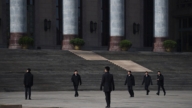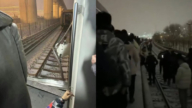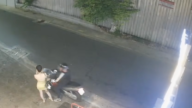【新唐人2011年6月1日讯】在内蒙古爆发一系列抗议浪潮之后,中共总书记胡锦涛5月30号召集中央政治局会议,要求各地全面加强社会控制,以防止中国出现大规模的社会风险。评论者认为,内蒙古大规模抗议是累积多年民愤的爆发。中共强力堵截,统治危机只会加深。
曾在内蒙古插队十年的中国青年报《冰点》周刊前主编李大同,对英国BBC表示,这次内蒙古抗议是积累了多年的民愤,情绪的爆发。早在1980年代中期,内蒙的许多地方就开始大规模开矿,大草场被啃噬的千疮百孔。当地的蒙古老乡对开矿愤怒之极,他们赖以生存的草场被破坏了,虽然矿主给当地政府分利,但牧民却得不到一丁点补偿。
蒙古族作家巴雅古特说,豪放爽朗的蒙古人总是乐观包容,但是他们今天生气了,因为他们赖以生存的草原连遭毁坏,他们已经到了走投无路的境地。在他们的家门口,不是挖煤坑就是蓄油池。最初,牛羊经常掉油池而死,没有人负责﹔而现在,车轮敢从人头上碾过,并且有人纵容。大草原下面丰富的矿产和石油,给蒙古人带来的不是幸运,而是不幸。
胡锦涛在30号的政治局会议上承认,中国“正处于社会矛盾凸显期”,各种社会矛盾的激化使社会管理变得更加复杂和困难。胡锦涛要求加强公共安全体系,强化社会管理。胡锦涛特别提到了对“特殊人群”的控制和疏导,并要求强化信息网路的管理。
中国经济学家茅于轼认为,政治改革落后,导致民怨丛生。
茅于轼:“抗议浪潮的根本原因就是我们政治改革滞后。经济改革很成功,但是政治上进步不大,引起的社会矛盾得不到及时处理,越积越多。这是根本的原因。政府对老百姓的要求不够认真对待。说是为人民服务,但是服务的很差。”
北京担心内蒙古的抗议运动演变成“茉莉花革命”,尤其担心这种街头革命波及内地。内蒙古当地学校遭到警方封锁,禁止学生参加集会。呼和浩特等城市有大批警车和武警在街上巡逻,市区的广场、公园等大型公共场所拉起了警戒线,防止人群聚集;当地的大学也禁止学生外出。
东南大学法学院教授张赞宁认为,胡锦涛的做法是错误的,政府对于民众诉求应该是疏导,而不是镇压。
张赞宁:“现在政府跟老百姓的矛盾比较深。之所以比较深,我看问题在政府,因为我们政府是一个不讲诚信的政府。你比如房屋拆迁,他就不讲诚信,所以很多问题上都不讲诚信。 群众应当有抗议示威请愿的自由,也应当给老百姓一个讲话的疏通的渠道,如果没有这个管道,那么可能矛盾会越来越勤密。”
盛产石油和煤炭的内蒙古因为遭到滥采,严重破坏草原生态,牧民深感不满。这个月11号,牧民莫日根试图阻拦运煤货车开入草原时被撞身亡,内蒙古多地爆发了持续近20天的示威,当地有多间学校的学生高呼蒙语,上街抗议。
新唐人记者秦雪、王明宇采访报导。
Hu Orders Stronger Control
After a series of violent protests in Inner Mongolia,
Hu Jintao called a Politburo meeting on May 30.
They discussed an overall strengthening of social
control to prevent large-scale outbreaks in China.
Commentators believe that those protests resulted
from anger accumulated over the years.
Government’ blocking would only deepen the crisis.
Li Datong, former editor of the Ice Point weekly
who used to do labor work there for 10 years,
told BBC that this incident is a burst of the grievances
of the Mongolians accumulated over the years.
From mid 1980’s, large mining activities took place
across the Inner Mongolia, devastating the prairie there.
The Mongols are indignant, as the grasslands that
they live on are damaged.
Although the miners share profits with the local
government, the herdsmen get nothing.
Mongolian writer Bayagute said,
“Mongols are simple, bold and always optimistic,
but they are angry today, because of the destruction
of their grassland. This is a desperate situation.
At their front doors are coal mining pits or oil tanks.
No one cares their cattle or sheep drown in oil pools.
Now no one cares when trucks run over people.
The rich mineral and oil under the prairie
bring nothing but misery to the Mongols.”
Hu admitted during the meeting that social conflicts
are obvious now as they intensify.
He called for strengthening the public security system.
Hu particularly mentioned control of “special groups"
and requested strengthening network management.
Chinese economist Mao Yushi believes lagging
behind in political reform will result in retaliation.
Mao: “The root cause of protests is political reform
lagging behind. Economic reform was successful,
but there is small progress in politics.
Social conflicts pile up due to lack of timely
management. The Chinese Communist Party
(CCP) has not taken seriously the Chinese people.
They claim serving people, but serve so poorly.”
Beijing fears protests in Inner Mongolia turning into
a “Jasmine Revolution," in particular,
spreading throughout China. In Inner Mongolia,
police block local schools to prevent students
from gathering; a large number of police vehicles
and armed police patrol the streets, city squares,
parks and other public areas. University Students
are also prohibited from going out.
Law Prof. Zhang Zhanning at Southeast University
thinks that Hu is wrong and the CCP
should provide guidance to people, not repression.
Zhang: “There are deep conflicts between the people
and the CCP, the issue is with the CCP. The CCP
is dishonest. For example, in demolition of houses
it broke its promises. People should have the right
to petition, you need to give people a way to air
their grievances, otherwise conflicts will deepen.”
Excessive production of coal and oil badly damage
grassland ecology, and local residents are not happy.
On May 11, pastoralist Mo tried to stop a coal truck
from driving on the grassland. He got hit and died.
Protests broke out in Inner Mongolia for 20 days.
Many students from local schools protested
on the streets shouting in Mongolian.
NTD reporters Qin Xue and Wang Mingyu
























